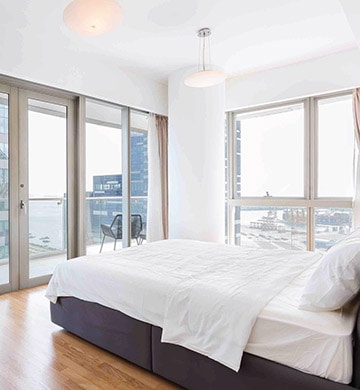
A Hmlet room in Singapore where millennials may get impacted
Singapore co-living enterprise Hmlet has agreed to acquire Hong Kong competitor we r urban, extending its reach to a third Asian city and increasing capacity by 23 percent overnight, according to a statement by the company.
The acquisition adds we r urban’s 30 co-living spaces to Hmlet’s portfolio of 18 venues, and marks one of the first significant acquisitions in the fast-growing market segment in Asia. No financial details of the acquisition were disclosed.
“Hong Kong is a natural next move for Hmlet, and this investment allows us to impact millennials across Hong Kong, allowing them to grow, scale and succeed.” said Yoan Kamalski, CEO and Co-Founder at Hmlet.
Kamalski founded in Hmlet in 2016 and the company’s portfolio now includes five properties in Tokyo alongside 13 in Singapore, offering accommodation for up to 300 people.
The venture-backed startup has two fully dedicated buildings in Singapore — one in Joo Chiat and a second on Sarkies Road, and with the we r urban will add space for another 70 members.
Aiming to Double Hong Kong Footprint This Year

Hmlet’s Kamalski says move to Hong Kong is the natural next step
Backed by Woh Hup Holdings affiliate Aurum Investments, Hmlet raised $1.5 million in funding in November last year, and now says it would like to double the number of we r urban tenants in Hong Kong by the end of 2018.
As the Singapore startup seeks to expand in Hong Kong, it will face competition from growing number of local and regional investors who are taking to co-living as the next shared economy real estate play.
Gaw Capital was one of the first Hong Kong players to experiment with co-living when it introduced the 48-room Campus Hong Kong in Tsuen Wan in 2016.
Since then Synergy Biz, which also runs co-working spaces, has opened two co-living sites in the city, Bibliotheque in Mongkok and SynBOX in Hung Hom as it too seeks to find new ways to offer shared, high-end spaces in the world’s most expensive real estate market.
Just less than one year ago, former APG executive Sachin Doshi closed on just under $60 million in funding for his newly founded Emerald Lake real estate private equity firm to invest in Weave Co-Living, a new co-living platform in Hong Kong.
M3 International Youth Community also has four locations in Hong Kong, while Mini Ocean Park Station at Shouson Hill claims to be the largest co-living space in the SAR with 270 rooms.
Co-living Boosting Yields
Hmlet and we r urban offer apartments and rooms on a short-term basis, with Hmlet allowing month-to-month leases with a minimum three-month commitment. While co-living is not precisely defined, it usually involves individual rooms, shared common spaces and some sort of community.
Co-living has become especially popular in cities where rents are high. In a March 2018 article, JLL wrote that apartment owners can boost net operating income yields by 400 basis points, and hotels by 300 basis points.
Leave a Reply